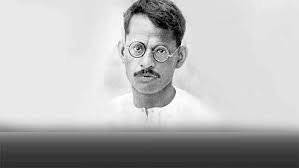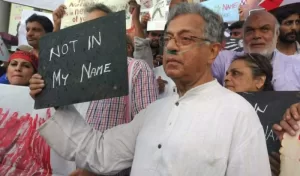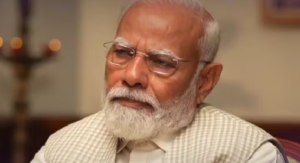March 25 is the 90th death anniversary of a great freedom fighter, editor, worker and peasant leader, also deeply committed social reformer who sacrificed his life at the age of 40 while trying to stop communal violence and rescue persons from both communities trapped in it.
The reference here is of course to Ganesh Shankar Vidyarthi, the famous editor of Pratap who has a unique place in the annals of the freedom movement.
On his death Jawaharlal Nehru said, “He taught in his death what we will find difficult to teach while living for many years.”
Mahatma Gandhi said, “He has cemented Hindu-Muslim unity with his own blood.”
Vidyarthi had a unique place as a bridge between the revolutionary movement and the mainstream Congress movement. He headed the Congress in the very important United Provinces (roughly Uttar Pradesh today) but also enjoyed complete trust and confidence of revolutionaries.
He was the greatest editor who fought the world’s biggest imperialist force (and its many lackeys) relentlessly for 18 long years right till his death, one foot in prison or court, one in a small office.
He not only covered struggles of workers and peasants in his newspaper, he went right ahead and mobilized and unionized them.
Ganesh Shankar gave ample of his writing skills and deep social commitments even in his school days. Moving to journalism in Kanpur, which became the main centre of his work, he soon attracted attention for his zeal and capabilities for public interest writing and campaigns. With the support of a few influential friends, he launched a magazine Pratap to report on freedom movement and other struggles. Public response was so good that this was converted into a daily newspaper.
This newspaper soon became the most committed voice of the freedom movement and struggles of peasants and workers. A magazine Prabha was also launched.
Vidyarthi was active in the Congress-led movements and established a well-deserved reputation as a leader of great commitment and honesty. At the same time he sympathized with young revolutionaries and arranged various kinds of help for them. He helped leading revolutionaries like Ashfaqullah, Ram Prasad Bismil and Bhagat Singh in various ways. In fact Bhagat Singh worked as a journalist in his office for some time as a sort of assistant editor, writing under a pen name to escape police attention. Later when Bhagat Singh, Jatindranath Dass and other were on hunger strike in prison, Pratap’s reporting played an important role in informing people and mobilizing public opinion on this. The confidence of the revolutionaries in his judgment and understanding increased to such an extent that they would go ahead with some important plan of action only after ascertaining that this had the approval of Vidyarthi.
Meanwhile on the insistence of people he fought as state council elections and won with a huge margin despite not having any financial resources. After this he was made the President of the State Congress Committee. More senior, national leaders could not have been unaware of his close relations with revolutionaries but he was selected for this important post on the strength of his great reputation of honesty and commitment as well as his huge popularity among people cutting across caste and religious divides.
He had also been organizing meetings and gatherings on communal harmony. His association with one such organization called Hindustani Biradari was close.
Ganesh Shankar was involved in a mobilization of textile workers of Kanpur and he played a similar role in taking forward some struggles of peasants of the United Provinces.
Apart from the main freedom movement, several sporadic struggles had started in various kingdoms. These involved very courageous and sincere activists, but faced brutal repression at the hands of the various royal regimes. Ganesh Shankar Vidyarthi took up their cause with a lot of zeal and courage. To check him and his reporting of these struggles (such as those in Bijoliya, Rajasthan and Gwalior, Madhya Pradesh) in Pratap, several court cases were started against Pratap and Ganesh Shankar which he faced with courage and determination.
His writings covered a vast ground of justice and struggle related issues, and he was a leading figure in the contemporary literary field. Even though he was writing most about freedom and other struggles of India, the struggles in other parts of the world also attracted him, and we also find him writing with passion on a contemporary struggle of people of Morocco. Despite the extremely difficult conditions in jail, he managed to translate works of Victor Hugo during his imprisonment days.
He was jailed five times. He saw the terrible conditions of jails and prisoners from close quarters. He was so appalled by what he saw that he strongly wrote about demolishing these jails. He was a strong advocate of jail reforms ad rights of political prisoners.
In 1931 he was released from jail and was trying to catch up with pending work when terrible communal riots (widely alleged to be pre-planned by colonial rulers) erupted in Kanpur. It was in the course of trying to rescue trapped people of both communities that Ganesh Shankar Vidyarthi was killed. Hence he sacrificed his life for Hindu-Muslim unity and harmony.
He will always be remembered as our greatest editor ever who also made most invaluable contributions to freedom movement and inter-faith harmony.
(Bharat Dogra is a journalist and author.)




